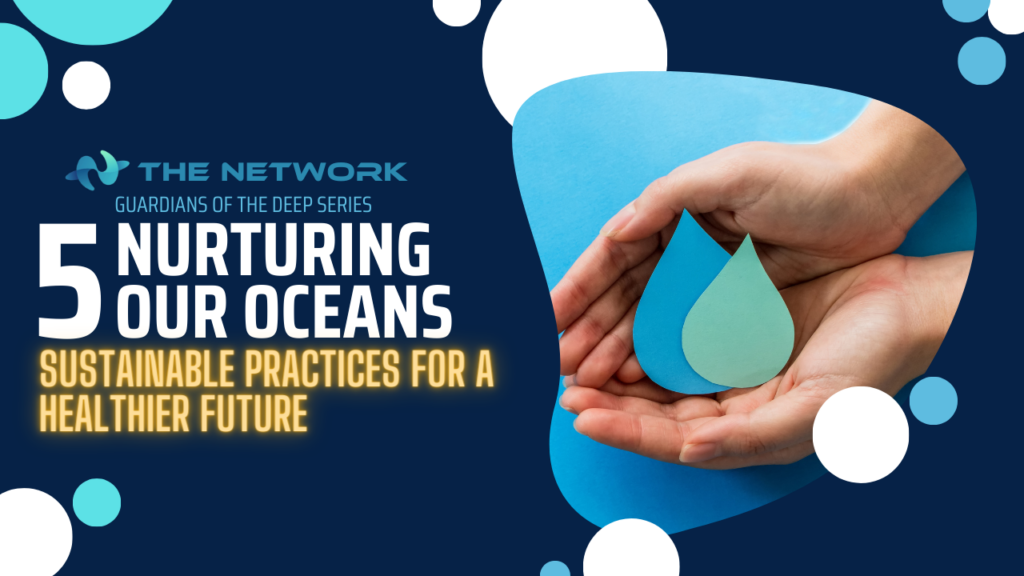Nurturing Our Oceans – Sustainable Practices for a Healthier Future

Our oceans, covering over 70% of the Earth’s surface, are a vital part of our planet’s ecosystem. They provide food, regulate climate, and are a source of immense biodiversity. However, the health of our oceans is under threat due to various human activities. In this blog post, we delve into sustainable practices that can help nurture our oceans, catering to a diverse audience, including high school students, homeschooling students, and parents.
The health of our oceans is intricately linked to the well-being of the entire planet. From climate regulation to supporting diverse marine life, oceans play a pivotal role in maintaining ecological balance. Unfortunately, human activities such as overfishing, pollution, and climate change are endangering this delicate balance. It’s crucial to adopt sustainable practices to ensure a healthier future for our oceans.
Eco-Friendly Fishing: Navigating the Path to Sustainable Seafood
Eco-friendly fishing practices are essential to maintain the delicate balance of marine ecosystems. Overfishing depletes fish populations and disrupts the food chain. Sustainable seafood practices involve adopting fishing methods that minimize bycatch, protect habitat, and ensure the long-term health of fish stocks. Certifications like the Marine Stewardship Council (MSC) help consumers identify sustainably sourced seafood.
Balancing Economic Growth with Ocean Conservation
- Implementing Quotas and Regulations: Governments and industries must collaborate to establish fishing quotas and regulations to prevent overfishing and ensure sustainable practices.
- Investing in Aquaculture: Supporting responsible aquaculture can meet the growing demand for seafood without depleting wild fish stocks.
- Promoting Eco-Tourism: Encouraging eco-friendly tourism not only provides economic benefits but also fosters a sense of responsibility towards marine conservation.
- Developing Sustainable Technologies: Investing in innovative technologies can help reduce the environmental impact of fishing and maritime activities.
- Educating Stakeholders: Raising awareness among communities, businesses, and policymakers about the importance of ocean conservation is crucial for achieving a balance between economic growth and environmental protection.
Marine Protected Areas: Creating Safe Havens for Oceanic Biodiversity
Marine Protected Areas (MPAs) are designated regions where human activities are restricted to conserve marine life. These areas serve as sanctuaries for vulnerable species and help maintain biodiversity. Establishing and expanding MPAs is a key step in protecting our oceans from overexploitation and habitat destruction.
Green Shipping: Reducing the Environmental Impact of Maritime Transportation
The shipping industry contributes significantly to pollution and climate change. Green shipping involves adopting sustainable practices to minimize the environmental impact of maritime transportation.
- Utilizing Renewable Energy Sources: Implementing wind, solar, or hybrid propulsion systems can significantly reduce greenhouse gas emissions.
- Improving Fuel Efficiency: Investing in technologies to enhance fuel efficiency and reduce emissions is crucial for sustainable shipping.
- Adopting Eco-Friendly Ship Designs: Developing ships with eco-friendly materials and designs can minimize their impact on marine ecosystems.
Community Engagement: How Local Initiatives Can Drive Global Ocean Conservation
Communities play a vital role in ocean conservation. Local initiatives can have a global impact by fostering a sense of responsibility and inspiring change.
- Beach Clean-Up Campaigns: Organizing regular clean-up events helps remove plastic and other pollutants from coastal areas.
- Educational Programs: Schools, community centers, and local organizations can collaborate to educate people about the importance of ocean conservation.
- Promoting Sustainable Practices: Encouraging businesses and individuals to adopt sustainable practices, such as reducing plastic use and supporting local eco-friendly products, can make a significant difference.
School or Homeschool Learning Ideas
- Ocean Sustainability Simulation: Create a simulation where students take on the roles of policymakers, fishermen, and environmentalists to understand the challenges of balancing economic growth and ocean conservation.
- Virtual Field Trip: Organize a virtual field trip to a Marine Protected Area, allowing students to explore the biodiversity and understand the significance of protected zones.
- DIY Eco-Friendly Fishing Gear: Engage students in a hands-on project to create eco-friendly fishing gear, emphasizing the importance of sustainable practices.
- Debate on Sustainable Technologies: Host a class debate on the pros and cons of different sustainable technologies in the shipping industry, encouraging critical thinking and research.
- Community Action Project: Task students with organizing a local community action project focused on ocean conservation, such as a beach clean-up or awareness campaign.
What Our Children Need to Know
- The Impact of Plastic Pollution: Help children understand the consequences of plastic pollution by showcasing real-world examples of marine life affected by plastic debris.
- The Importance of Biodiversity: Illustrate the interconnectedness of marine species and the impact of losing biodiversity on the entire ecosystem.
- Empathy Towards Marine Life: Encourage empathy by discussing the lives of marine animals and the challenges they face due to human activities.
The Big Questions
- How Can We Encourage Sustainable Fishing Practices in Our Local Communities?
- What Role Can Technology Play in Balancing Economic Growth and Ocean Conservation?
- How Can Individuals Make a Difference in Reducing Plastic Pollution in Oceans?
- What Challenges Do Developing Countries Face in Implementing Sustainable Ocean Practices?
- In What Ways Can Local Communities Influence Government Policies for Marine Conservation?
Conclusion
The health of our oceans is a shared responsibility that requires global collaboration. By adopting sustainable practices in fishing, shipping, and community engagement, we can ensure the well-being of our oceans for future generations. It’s essential for individuals, communities, and nations to work together in navigating a path towards a sustainable and healthier future for our oceans.





Responses